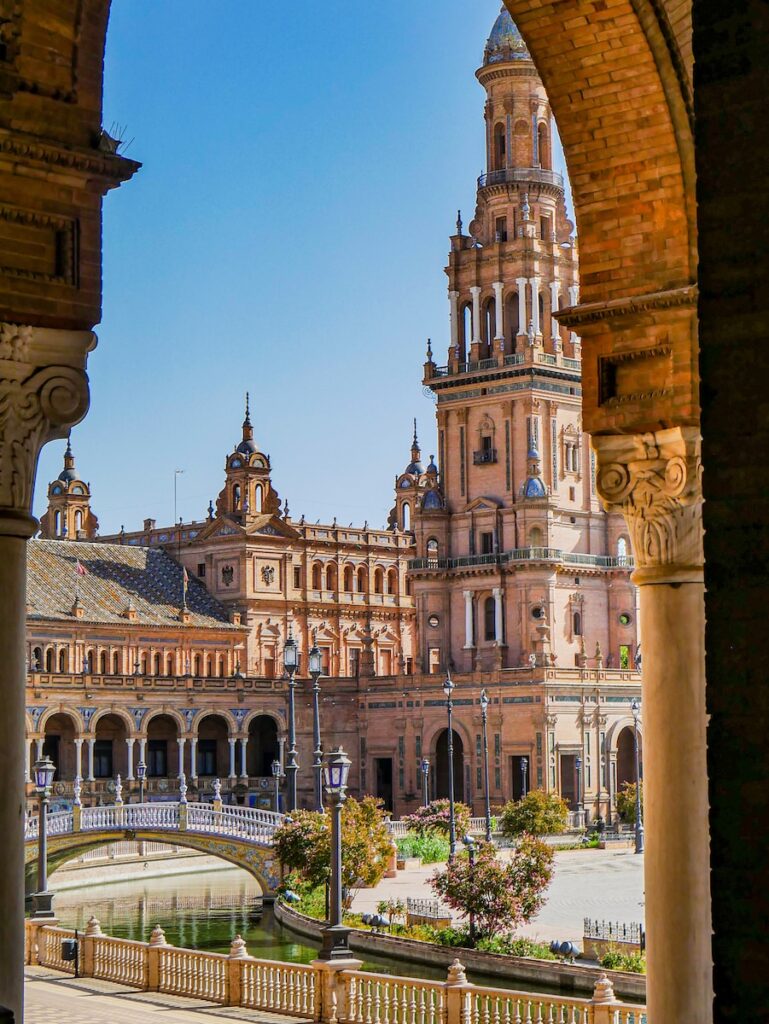The Ultimate Guide to Relocating to Spain
Coming up: big fun, bigger flavors, friendly faces, admittedly-boring bureaucracy, prices, pets, people… and everything you need to know about relocating to Spain.
So, you’re thinking of moving to Spain.
Good choice!
More than 6 million non-natives live in the country… so you’re joining a keen crowd.
(and, clearly, you’re moving to a place where it’s easy and appealing to start a new life).
Perks of moving to Spain include good weather, high levels of English, many visa options (and a no-visa-needed scheme for other EU/EEA citizens), and excellent food and culture. But we’ll come to all the details soon.
Coming up, your good buddies at Homelike have brought you everything you need to know about relocating to Spain. We’ve included info on food, kids, healthcare, having loads of fun, cities where you might want to live, finding a home, and plenty more.
As they say in Spain: vamos!
Why Move to Spain?
Moving to Spain serves up many perks. They include:
- Excellent weather: many people move to Spain (especially southern Spain) because of the year-round warm temperatures. Unless you’re relocating to some mountain town, even the winters aren’t cold.
- Some of the planet’s best healthcare: the nation has the highest average lifespan in Europe… and ranked 21st in the 2022 World Index of Healthcare Innovation.
- Decent cost of living: okay, Spain certainly isn’t super-cheap. But it’s more affordable than most other parts of western Europe. And in smaller cities, life can be pretty low-cost.
- Many different residency options: people from the EU can move here with no stress and little bureaucracy… while other people can choose between the Golden Visa, the digital nomad visa, the non-lucrative retirement visa, and other options.
- Great after-work culture: including some of the world’s best nightlife (with endless bars and nightclubs, and a BIG late-night culture), some of the world’s best food, and a reasonable work-life balance.
- Lots of events: Spanish people are proud of their culture, and they like having fun. Combine those two things, and you get loads of festivals and events—along with many museums, galleries, and cultural venues.
- Endless outdoor fun: for heading into nature, this is one of Europe’s best countries. You get 8,000 kilometers (5,000 miles) of coastline, along with lakes, mountains, deserts and volcanoes. But best of all, Spain is home to lots of waymarked hiking trails, waymarked cycling trails (including Eurovelo rides), and pilgrimage routes.
Friendly people: Spanish people are open, warm, and friendly. Add that to all the other foreigners in Spain (including, probably, people from wherever you’re from), and you’ll find it easy to make friends here.

Do I need a visa to live in Spain?
That depends on where you’re from.
If you’re from another part of the EU/EEA area, you don’t need a visa. And relocating to Spain is super easy for you (because of the region’s freedom of movement scheme). If you’re gonna be in Spain for longer than three months, you need to register your residence. And aside from getting your NIE number (more on that soon) that’s all you need to do!
If you’re NOT from the EU/EEA area, relocating to Spain is a bit more complicated. And you will need a visa. All the different visa options are listed here—but assuming you’re moving to Spain to work, you’ll need to get a work visa. There are many types of work visa, and different options have different lengths.
But no matter the type of visa you get, you’ll then need to obtain a temporary residence permit…
… and after 5 years have passed, you’ll then be eligible for a permanent residence permit (so you can stay in Spain forever!)
If you’re from the UK, Brexit has made your life harder. And, now, moving to Spain (long-term) for you works just like it does for anyone else from outside the EU/EEA area. Yes, you can visit the nation for 90 days with no visa—but after that, that’s when you need to get all bureaucratic.
Here’s more information on moving to Spain after Brexit.
And good news for remote workers: the nation now has a digital nomad visa (more info here). To qualify, you need to earn (at least) approximately $2700 per month (or $32400 per year). You also need a valid passport and a clean criminal record—and the visa allows you to live in Spain for up to 5 years.
Do I need to learn Spanish if I’m moving to Spain?
You don’t need to learn Spanish if you’re moving to Spain:
… many young people (and some older people) speak English. And many expats choose not to learn Spanish.
But you should learn Spanish.
If you do learn the language, life will be better. You’ll make more friends, everyday communication will become easier, bureaucracy will be way more simple, and you’ll better understand life and culture. And most importantly, you’ll be able to communicate with everyone!
(and as a side note: Spanish people will appreciate your efforts).
For getting started, the best option is Duolingo. For moving on, check out Babbel and Rosetta Stone. For face-to-face lessons, we recommend Lingoda and Preply… or heading to an in-person language school.

What is the cost of living in Spain?
That depends where you’ll be living.
… but here are some cost-of-living stats for some of Spain’s most popular cities:
Barcelona
1-bedroom apartment in the city center: €1,235
Regular monthly pass for local public transport: €23
Meal for 1 at an inexpensive restaurant: €15
Regular cappuccino in a cafe or restaurant: €2.25
12 regular eggs from a supermarket: €2.70
Madrid
1-bedroom apartment in the city center: €1,144
Regular monthly pass for local public transport: €40
Meal for 1 at an inexpensive restaurant: €13.50
Regular cappuccino in a cafe or restaurant: €2.04
12 regular eggs from a supermarket: €2.74
Valencia
1-bedroom apartment in the city center: €960
Regular monthly pass for local public transport: €30
Meal for 1 at an inexpensive restaurant: €12
Regular cappuccino in a cafe or restaurant: €1.62
12 regular eggs from a supermarket: €2.57
Seville
1-bedroom apartment in the city center: €1,112
Regular monthly pass for local public transport: €35.30
Meal for 1 at an inexpensive restaurant: €12
Regular cappuccino in a cafe or restaurant: €1.71
12 regular eggs from a supermarket: €2.50
Malaga
1-bedroom apartment in the city center: €975
Regular monthly pass for local public transport: €28
Meal for 1 at an inexpensive restaurant: €12
Regular cappuccino in a cafe or restaurant: €1.94
12 regular eggs from a supermarket: €2.48
… you can find much more information at Numbeo. Search for the particular city you’re interested in, and you’ll see prices for travel, housing, leisure, eating and drinking, market prices, and more.
What housing options are available in Spain?
If you want to buy a home, the best places to start looking are Idealista and Fotocasa. But because of the bureaucracy and the language barriers, we recommend working with an agent. Buying a home in your native country is tough; buying one in a foreign country is even tougher.
To rent, both Idealista and Fotocasa can be good options too. To rent a room in a houseshare, head to Pisocompartido. Another good option for finding a rental is Facebook. Hop on the site, and search for terms like ‘housing in [city name]’ or ‘apartments in [city name],’ and you’ll find many options.
Bad news alert: finding a place to live is one of the most frustrating parts of moving to Spain. You have lots of competition, Spanish-speaking locals have an advantage over you, some places are unfurnished, and local landlords can be a little unreliable…
… which all means you’ll usually wind up paying high prices for low-quality places. And to find a good place, you’ll need to do lots of searching, visiting, and negotiating.
If you can’t be bothered with all the stress and confusion, do what many others do: look for fully equipped apartments or flats in Spain. All of ours are comfy and cozy, they’re all fully-furnished, they’re all perfect for living and working, and we won’t rip you off. Simple!

What is ‘Empadronamiento’?
‘Empadronamiento’ translates to ‘census’…
… and when you go through the empadronamiento process, you’re simply registering your long-term presence in Spain. If you’ll be staying in any Spanish city for 6 months or longer, you need to do the process.
EVERYONE who fits the above criteria has to do this:
- People who are moving to Spain for the first time,
- People who’ve lived in Spain before,
- Even lifelong locals.
It’s a legal requirement. But, just as importantly, it’s key for long-term life: if you don’t do it, you won’t be able to buy a home, rent a car, send your kids to school, and all those other essential things.
To start the process, you can make an appointment at your local town hall (‘ayuntamiento,’ in Spanish), or tackle the process online. To do your empadronamiento online, Google ‘empadronamiento [whichever city you’re moving to],’ and you’ll find the correct portal.
We won’t give you too much detail, because we’ve already done that here. Note: that guide is about Barcelona, but all the rules apply across all parts of Spain.
What is the Spanish healthcare system like?
As we’ve mentioned, Spanish healthcare is some of the best in the world. Hospitals and doctors are world-class, waiting times can be short, you get a huge number of hospitals and clinics, and both public and private healthcare is excellent.
Anyone who is officially registered as living and working in Spain can receive public Spanish healthcare (known as the ‘Sistema Nacional de Salud,’ or ‘SNS’).
To register for public healthcare, you need to get a Spanish health care card (known as the ‘tarjeta sanitaria individual,’ or ‘TSI’). This healthcare is of course funded through taxes… which, if you are working, you will be paying. More information here.
If you want to access private healthcare (which is of course better, with shorter waiting times), you’re not alone. Around a quarter of Spain’s native population has some form of private health coverage… and MANY expats choose to have a private policy.
If you have private health coverage, you’ll pay around €50-200 a month—and the best providers are AXA, Cigna, and Bupa.
An important note: although the Spanish public healthcare system covers the vast majority of healthcare, it doesn’t cover everything. So if you need regular specialist care, you’ll need to check whether or not you’ll need to pay for it.
What should I know about the Spanish education system?
In 2021, the nation ranked 17th for education in the annual ‘Best Countries Report.’ Good news if you’re moving to Spain with kids!
In all big cities, you’ll find both Spanish-speaking schools and international schools. Of course, if you want a wider range of international schools, it’s best to move to an expat-popular city (like Barcelona or Madrid).
Between the ages of 6 and 12, kids go to primary school. From 12 to 16, they go to secondary school. All kids need to attend school during these ages—and all education is free (unless, of course, you choose a private school). After 16, kids can choose to go to further education.
And between the ages of 3 and 6, parents can choose to put their kids into kindergarten. These kindergartens are usually free of charge.
How do I find a job in Spain?
The best sites for finding jobs in Spain are Infojobs, Indeed, and Infoempleo.
Some job seekers also use LinkedIn, while others use recruitment agencies. Some recruitment agencies (like this one), are bilingual, and can help you to find English-speaking jobs in Spain.
According to this site, “the average salary in Spain as of 2022 is around €27,000/year.” But in bigger cities (especially Madrid), salaries are typically a little higher.
How do I open a bank account in Spain?
Opening a bank account after relocating to Spain is fast and easy.
You’ll need your ID (preferably a passport), along with proof of address (even if this address is temporary). If you want an in-branch account, Santander and BBVA are two popular options. Head to a branch and make an appointment.
Because you probably don’t speak Spanish (and even if you do), the easiest option is usually to open an online bank account. If you’re gonna do that, your best options are N26 and Revolut. Download one of the apps, fill in the details, and you’ll have an account within minutes. Easy!
What is an NIE number?
An NIE number (Foreigner Identity Number) is essential for long-term life in Spain:
Every foreign resident needs one (even if that foreign resident is from the EU/EEA area). Without one, you can’t work, or pay taxes, or get a bank account, or do all the other things normal people need to do.
To get your NIE… either visit your local immigration office (if you’re already in Spain), or head to your local embassy or consulate (if you’re not already in Spain).
It costs €12, and you need to take your passport, proof of your address, and a completed application form. You can find the form (and more information) here.
What should I know about transportation in Spain?
Moving to Spain is absolutely possible without a car.
Across the nation, you get:
- A massive train network, with over 2,000 stations, covering large parts of the country…
- … and where the train network doesn’t cover a long-distance journey, a long-distance coach will. The nation’s two most popular long-distance coach companies are Alsa and Avanza.
- Over 40 airports, offering domestic and international flights.
- And excellent inter-city public transport (which, depending on the city, might include buses, trains, trams, metros, and more).
And if you do decide to drive, you’ll find well-maintained, well-signposted roads. And most Spanish drivers are relatively safe and unselfish.
… and because Spain borders 5 countries (including Morocco!), you can easily reach other nations without ever having to fly.

What should I know about Spanish cuisine?
One of the best parts of moving to Spain!
Spanish food is WAY more diverse than most people expect.
Saliva-inducing highlights include:
- Tapas and paella: the old classics!
- Meat: the nation is Europe’s third-biggest consumer of meat and fish! Highlights include cured meats (like chorizo and jamon), meat stews, and lots of pork.
- Cheese: the nation is home to more than 150 vaieties of the stuff.
- Lots of fruits and vegetables: the Mediterranean diet (partially because of the warm weather) includes a huge amount of fresh produce. Expect lots of tomatoes, peppers, zucchini, onions, garlic, lemons, oranges, grapefruits, and more.
- Wine: Spain is the world’s third-biggest producer of wine. Here’s more.
- Seafood: with a big coastline comes a big range of fishy treats. Expect squid, octopus, prawns, mussels, cuttlefish, fish stew, and plenty more.
- Desserts: including flan, churros, crema catalana, and rice with milk.
Broadly, Spanish people usually eat a light breakfast, a big lunch, and a medium-sized dinner.
… and, as you might already know, eating is a big deal in Spain—people prioritize eating good food, having dinner with friends, and large family meals.
What is Spanish weather like?
Generally, Spain is warm.
But the exact details will depend upon where you’ve living… and different times of year bring different climates.
Here’s a broad idea of what you can expect:
- Summers have high temperatures (usually sitting above 30°C/86°F during daytimes) and little rain. The north (and mountainous places) will be a little cooler.
- Winters are the rainiest period. But it’s still pretty warm—it’s rare for temperatures to drop below freezing (and it’s VERY rare for that to happen outside the north).
- Both fall and spring have pleasant daytime temperatures (with highs usually sitting somewhere between 15°C/60°F and 26C/80°F, depending on where you visit) and cool(ish) evenings. Spring sometimes serves up rain, and fall can be a little stormy.
But you should remember: different regions (and cities) have different weather patterns. Here’s a great site for checking monthly patterns in specific cities.
Broadly speaking, the more south you go, the warmer it gets. Seville is the nation’s hottest city, Barcelona is rainier than most other big cities, and Madrid offers a good balance.
What are the best places to live in Spain?
- Barcelona: the #1 choice for expats moving to Spain—around 20% of the city’s residents are non-natives. Perks include a combo of beaches and mountains, the ease of making friends, and a packed calendar of events (you’ll find endless things to do on any day). But, without moving into a serviced flat, it can be hard to find a place to live.
- Madrid: Spain’s capital, and another popular choice. It offers a young population, an excellent nightlife scene, a less-busy atmosphere (the population density here is 3x lower than Barcelona), and a central location (so you’re never far from any other part of Spain—and you get the nation’s busiest airport!).
- Valencia: when people relocating to Spain want a well-equipped-but-not-too-busy city, this is often where they choose. Sitting in the middle of the nation’s east coast, you get great beaches, sunny summers, and excellent seafood. And although it’s a modern city, it still feels quite traditional.
- Malaga: sitting right on the nation’s south coast, this is where you want to head for all-year sun. Other high points include lots of beaches and mountains, excellent hiking and cycling, and a busy international airport. And because lots of English-speaking people retire here, it’s a good spot for making friends.
- Seville: the least touristy of all the places we’ve brought you, moving to Seville feels like you’re really moving to Spain. You’ll find flamenco, tapas, Moorish architecture, some affordable housing, and a small city center.
What to know about social life and entertainment?
For many young people, this is one of the best parts of relocating to Spain.
It’s easy to have a great social life in the nation: nightlife is some of the world’s best, venues stay open very late, people prioritize eating together, and there’s a great cafe culture.
Fun fact: Spain’s nightlife industry generates more money than any other nightlife industry in any other part of Europe. Which, for partygoers, simply means LOADS of bars, pubs, and nightclubs.
You’ll also find many cultural venues: the nation is home to more than 1,500 galleries and museums.
And because Spanish people are friendly, it’s easy to make friends.
If you move to a bigger city (like Barcelona or Madrid), you’ll find events and entertainment every night of the week. And on top of all that, you get a hefty programme of festivals, holidays, and events.
And that brings us to…
What are some Spanish festivals and holidays?
Spain has a huge number of events, festivals, and holidays:
In 2021, the nation hosted almost 900 music festivals.
Some of the Spain’s biggest music festivals are:
… while some of the nation’s best non-music festivals are Holy Week (Semana Santa), the parade-packed Fallas of Valencia, and the iconic La Tomatina (when everyone throws tomatoes at each other for a day).
You’ll also find festivals related to traditional slices of life, like food, flamenco, and religion.
For a packed calendar of events and festivals, moving to Spain is a top-quality choice.
Is Spain pet-friendly?
Yes, Spain is very pet-friendly.
More than 25% of Spanish households have a dog, you’ll always see domesticated dogs on the streets, and pets are welcome in lots of cafes, restaurants, and public transport.
Animal-abuse laws are quite strict, and some vaccines are obligatory.
But with laws comes rules. And if you’re moving to Spain with an animal, there are regulations you need to follow. Your pet needs to be vaccinated against rabies, it needs to be microchipped, and it needs a pet passport. You may also need to follow other rules—more here.
One of the biggest pet-based problems in Spain is finding a place to live—in big cities, many landlords don’t allow pets. But we have lots of pet-friendly apartments!
Is Spain safe?
Yes, Spain is very safe.
You can find lots of specifics here—but drivers are safe, serious crime is low, there are few threats of natural disasters, terrorist attacks are relatively infrequent, and women report high levels of safety.
What should I know about internet and telecommunications?
In the 2022 Digital Economy and Society Index (DESI), Spain was ranked 3rd in the EU for internet quality. So that means good WiFi, easy working from home, and world-class 5G.
… so unless you’re in a very remote area, you’ll have excellent internet access.
Unlimited household data for one month will usually cost around €32. And the most well-known internet providers are Movistar, Vodafone and Orange (but you also have plenty other options).
What about shopping and groceries?
In Spain, many locals buy their bread from the bakery, their meat from the butcher, and their fruits and vegetables from the grocer. So you’ll find many small non-chain local markets.
But like in any other developed country, you’ll also find many supermarkets—the biggest names include Mercadona, Carrefour, Alcampo, Lidl, and Aldi. .
Other important things to know about shopping in Spain include:
- Speaking Spanish will be useful
- Most stores are closed on Sundays
- Plastic bags usually cost around €0.10-€0.20
- Many of the biggest supermarkets sit outside of city centers
Moving to Spain from the US
People from the US can visit Spain for 90 days with no visa.
… but to make a permanent move, you’ll need to apply for the relevant visa, as outlined earlier.
Compared to the US, here’s how you’ll find life in Spain:
- People are more-laid back
- Customer service isn’t as ‘friendly’
- Spanish people go to bed later, and wake later
- Spanish people have a better work-life balance
- Bureaucracy can be slower and more confusing
- Public transport is much better (for both long and short journeys)
Moving to Spain from the UK
Again, moving to Spain from the UK is now tougher (because of Brexit).
But as we outlined above, it’s still possible. And you’ll need to follow the same rules that any non-EU/EEA citizens (including Americans) need to follow.
Adjusting to life in Spain is pretty easy for people from the UK… but some differences include:
- Spanish people have a more relaxed attitude to time and punctuality
- Spanish people place more focus on time with family and friends
- English people might find Spanish people a little warmer
- People go to bed a little later, and wake a little later
- Life is more affordable
- Weather is warmer
Compared to the UK, Spanish healthcare is pretty similar. Healthcare-related bureaucracy can be a bit more challenging in Spain, but waiting times are usually shorter, and private Spanish healthcare is more affordable than UK private healthcare.
Moving to Spain: final thoughts
That’s everything you need to know about relocating to Spain!
As you probably now know, we absolutely recommend moving to Spain. It’s affordable, it’s easy to make friends, the weather is great, the food is world-class, and you get a massive range of exciting events and outdoor adventures.
… but as we’ve covered, one of the biggest challenges of relocating to Spain is finding an apartment (especially if you don’t speak Spanish). Competition is high, some landlords are tough to deal with, and it’s often hard to know whether or not you’re getting ripped off.
So, many people decide to move into a serviced apartment or a serviced flat. With these places, you don’t need to do any negotiating, you don’t need to buy furniture, and you don’t need to spend endless hours meeting landlords and viewing properties. Perfect for saving time and avoiding stress!
Anyway, no matter which type of apartment you choose—enjoy living in Spain. We think you’ll love it!
Thanks for reading, and thanks for choosing Homelike. Adiós!






















